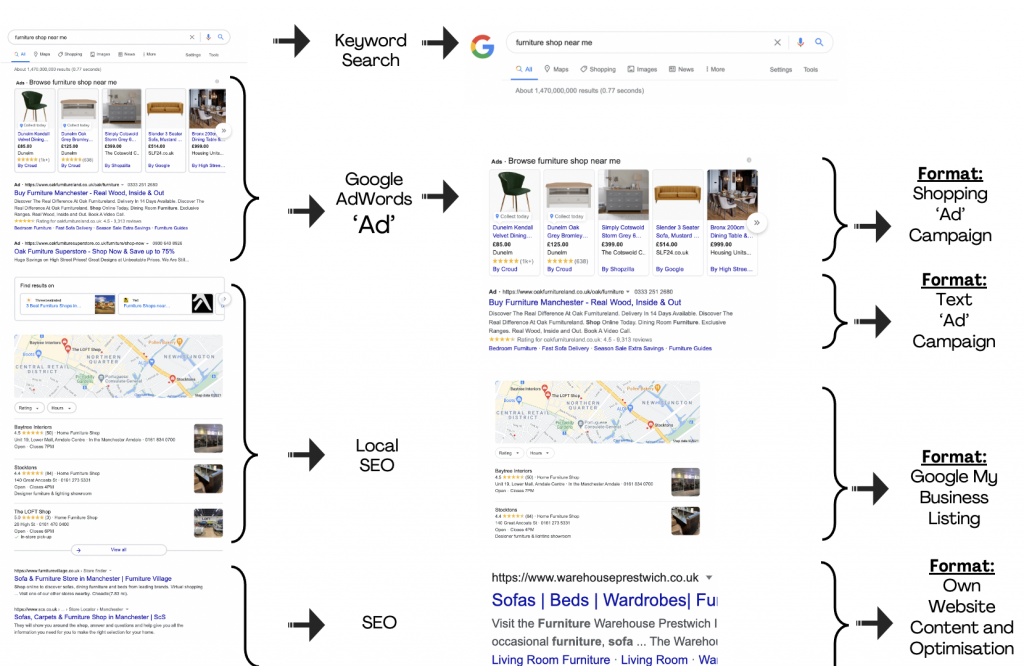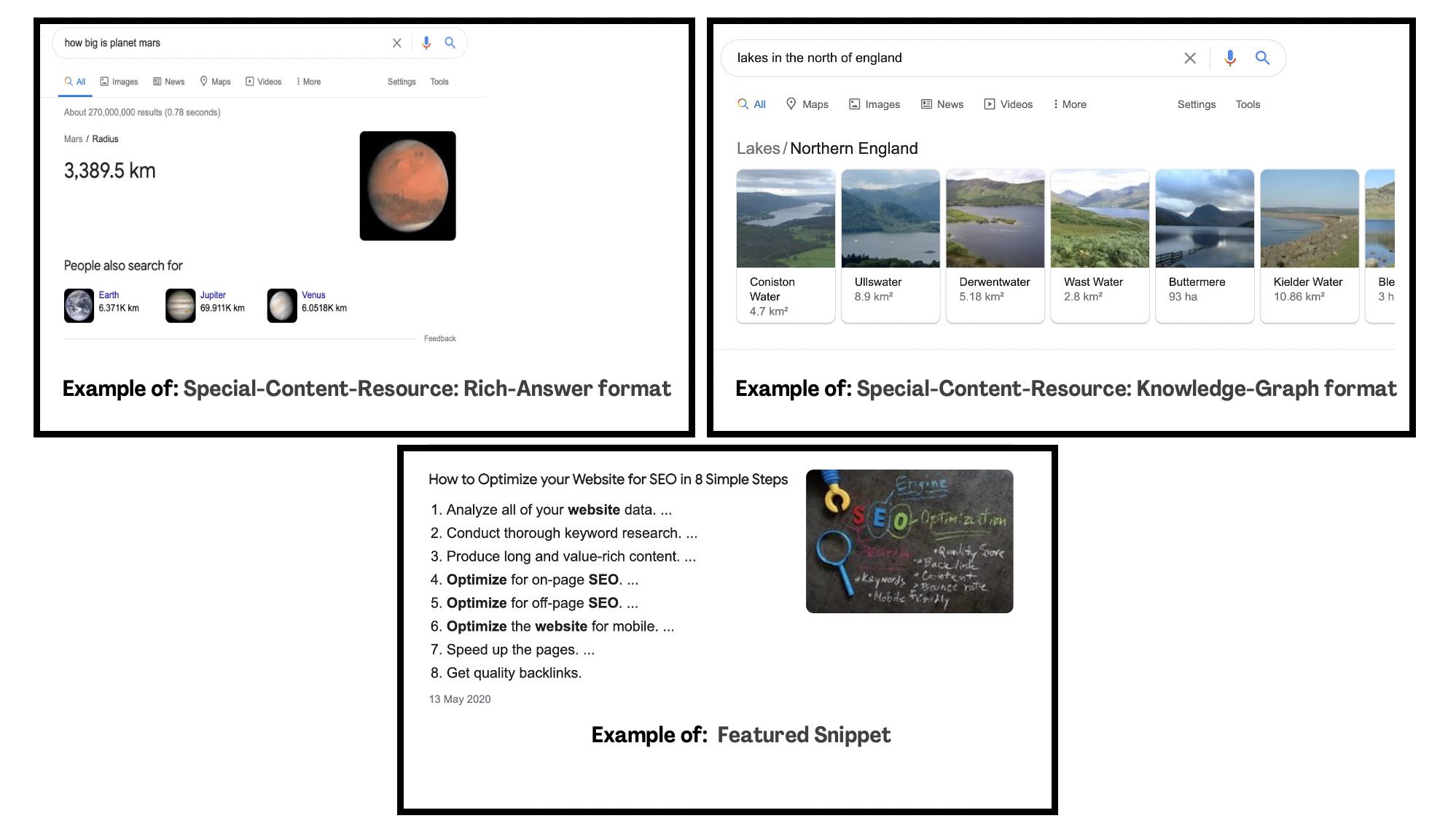ABOUT GOOGLE

What is Google?
Google is the world’s largest and most popular search engine. A search engine is an online platform that people utilise in order to source a product, service or answer a question. Several other search engines are available, such as Bing, Yahoo and DuckDuckGo. Both Amazon and Facebook are also considered search engines.
Frequently asked questions about Google Search
How does Google Search work?
Search engines work by using internet bots – also referred to as ‘spiderbots’ or ‘web crawlers’ – to methodically browse online platforms and web pages. They then add any optimised pages to their own index and order them based on a variety of different factors.
Whenever we turn to Google to search for a solution, the search engine matches the query with websites of best fit. These websites are listed in order according to Google’s ‘ranking rules’.
There are over 210 factors determining how each website ranks. Crucially, platforms and search engines regularly change the priority of these factors with ‘algorithm updates’. This means that businesses must actively work to optimise their website in order to better meet the search engine’s ‘ranking rules’ and to increase the likelihood of appearing first in users’ search results. Search engines – such as Google – do this in order to deliver the most relevant answers to user queries and to promote best online practice among businesses vying for first page coverage.
What is SEO?
SEO is an acronym for Search Engine Optimisation.
Depending on the query, Google will present users with search results best fitting to the current algorithm rules. As these ‘ranking rules’ change continuously, businesses must work continuously to optimise their website content in order to ‘convince’ Google’s Bots that their website is the best fit for certain search terms (keywords) and comparatively to other businesses.
Here are just some of the SEO techniques that are currently used, to help you get started:
- Selecting your relevant keywords
- Using these keywords in a natural way throughout the content you produce
- Include your keywords in title tags
- Optimise your meta descriptions (the small description paragraph that appears below a page’s title in the Google search results)
- Fix broken links
- Check for duplicate content and remove any
- Use a backlink tool to check who is linking to your site
- Check your competitors backlinks
- Earn links from the places you know your audience will be present
SEO takes time, but by optimising a website businesses are aiming to convince Google that their website deserves to appear organically (for free) on the first page of Google for their chosen relevant keywords.
With such fierce competition is SEO even worth it?
Google’s priority is the user, and with so many unethical and aggressive techniques practiced over the years, it’s a great thing that Google updates their ranking rules (algorithm) constantly to ensure the businesses appearing on page 1, truly are the best fit for the users query. And to ensure they haven’t achieved that position through SEO cheats, Google makes hundreds of changes each year.
When it comes to SEO, it really does pay to work with a technical SEO team, as they’re best positioned to maintain optimisation based on Google’s latest algorithm switch. And when we say ‘technical SEO’, we mean an SEO Engineer with the technical capabilities to apply comprehension of hands-on site based changes, analyse and draw insights from analytics, monitor advanced search behaviour, and to periodically reassess the changing marketplace.
With so many updates to command, vital changes could be missed. Google’s priorities change and so your SEO (Search Engine Optimiser) must constantly change their technique to match Google’s rules in real time.
SEO is worth it. Google knows what the user wants and therefore it is worth maintaining ongoing SEO to ensure the best possible experience for the user. SEO will not only deliver relevant website traffic but it will also increase the likelihood of conversions and repeat business.
Given that only 1 in 4 users click past the first page, the vast majority of people will be most likely to ‘click through’ to a website positioned on Google’s first page only.
When was the last time you checked page 2, 3 or 4 of the Google results that matched with your query?
What is a Keyword?
When looking for a product, service or answer, we commonly type keywords – phrases or search terms – into Google’s search bar. Those keywords will depend on what we want to search for and – while we may not know which businesses we want to use yet – we do want to find the best solution to our enquiry.
For instance, let’s say you live in Manchester and want to learn more about digital marketing. Depending on the specifics of what you want to find, you might type any of the following keywords and phrases into Google:
“digital marketing training in Manchester”, “digital training provider”, ”how to improve my position on Google” or “digital marketing for beginners”.
Google will then present you with the best fitting websites for the keywords you used. There are currently a remarkable 66,100,000 results found for the keywords “digital marketing Manchester”, and so you can see why the ongoing ‘Page 1 battle’ is so fierce.
What else can I do to appear on Google page 1?
Currently, a business can increase the likelihood of appearing in the first page of Google’s results by using different methods, including:
- AdWords: sponsored ‘Ad’ results
- Google My Business
- Organic results: achieved through SEO
The first results page of Google is a fierce battleground, where businesses compete against each other to hit the top visible results position mostly across three separate sections on page 1 of Google.
Noteworthy is that AdWords (PPC), Google My Business and organic SEO are completely separate and don’t influence the results, cross-sectional. Therefore, each needs separate attention. 
What do I need to know about Google AdWords?
Typically, the top 1-4 results immediately below the search bar that display the words ‘Ad.’ are the sponsored ad results taken from Google’s SEM platform, which is called AdWords.
SEM is an acronym for Search Engine Marketing. Search engines, such as Google, Bing and Amazon offer SEM, where a business can pay to sponsor certain keywords to ensure that their ad. achieves a higher search result position.
There are different Google AdWords ad. listing formats including text ads, responsive ads, images, app promotion, in-stream video and shopping ads. The format of the ad will depend on the nature of your industry and what you are trying to promote.
What is Google My Business?
Below the ads, depending on the industry or nature of search query you will typically find either the Google Maps result or sometimes Featured Snippets.
The Google Maps listing is a position that’s achieved through a ‘Google My Business’ listing. It is visual and offers prime positioning on the first page of Google results. Businesses must have a physical business office or brick and mortar presence to be able to list here. When you hear the term ‘Local SEO’, this in most cases relates to the presence and optimisation of your Google My Business profile.
What is a Featured Snippet?
Depending on the nature of the question or search being conducted, you may also see Special- Content-Resource-Block results or Featured-Snippets on page 1. These formats offer information to the searcher in a quick, convenient and informative way. It’s easy to read and in many cases provides the answer to the search question without the user having to actually leave the Google platform. According to Search Engine Journal, Google decides what appears here, and in some cases these results don’t link to an external website.
Here’s an example to demonstrate how you may have seen the different formats, depending on the nature of your search query:
Special-Content-Resource: Rich-Answer format
Google doesn’t link this result to a website as it is information that’s part of the public domain.
Special-Content-Resource: Knowledge-Graph format
Usually, a photo carousel at the top of Google page 1.
Featured Snippets: Google results that are sometimes shown for who/what/where/when/why/how type questions. The format varies, depending on the nature of the query, for example. Including the following:
- Definition box
- The table
- List format

What do I need to consider when optimising my website?
Google’s priority is to ensure that users are provided with the best possible experience.
Website best practice includes content that is optimised around question format and keywords. For instance, providing question format demonstrates that your content will directly answer Google’s user search queries whereas the inclusion of specific keywords and phrases, for example “digital marketing Manchester” – will boost the likelihood of matching users’ keyword searches and associated keywords.
Another great way to appease Google’s ranking rules currently (in 2021) is to edit or rewrite your content regularly.
Dated content won’t provide the user with the most relevant answer to their question, so choose to update content that is starting to drop in rankings from a previously decent position and add improved or updated information to these posts. It’s best to do this regularly, so schedule in a regular content audit to keep ahead.
Finally and perhaps most crucially, ensure that your website is mobile-responsive. If a user cannot interact with your website from their mobile, Google will not rank your site. Check your site on your mobile through the eyes of your potential customer.
How much content do I need to produce?
Good quality, consistent and relevant content is important for ranking success as it helps to engage and build trust with the user. It also helps with domain authority i.e. how relevant the website is and the authority it holds over a particular subject.
Content length is also key; research from many credible published sources show that content containing more than 2000 words achieve better rankings, more links and a higher level of shares.
As a strategy, content marketing focuses on delivering high quality, relevant content to engage, attract and inform your potential customers. This type of marketing provides valuable content that offers answers to audience questions and positions the business and brand as expert within the field.
By providing valuable content, you provide confidence to your audience to trust in your specialism and services. Through offering content, you attract and engage with your audience effectively rather than intrusively pushing your brand or service.
HOW WE CAN HELP
If you’re a UK based business we are here to help you. Using our 15+ years of industry applied digital and creative experience, we have designed a straightforward process to help your business thrive in the digital world. Head over to our home page and take STEP 1. Answer some simple questions about your business to receive a phone or online consultation (you choose) and we’ll suggest the next best steps for you to achieve digital success. For anything else, CONTACT US to speak with a member of our team.
WHAT WE OFFER
- Digital Footprint Audit (Website, SEO, Social Media, Search, Reputation)
- Digital Marketing Strategy
- Competitor Analysis
- Social media management packages (including post creation, engagement and paid campaigns)
- Content creation and professional editing
- Email Marketing
- CRM Setup
WHY CHOOSE US
- We care
- We educate
- We support
- We deliver
- You thrive

